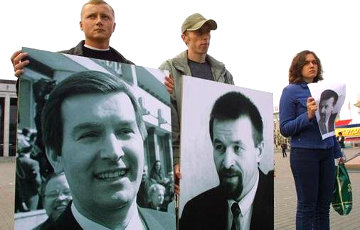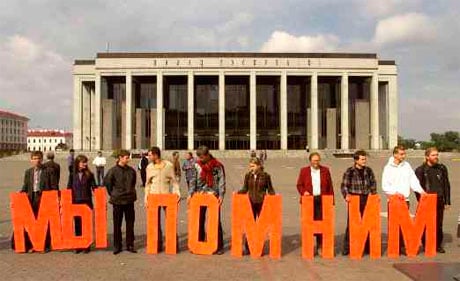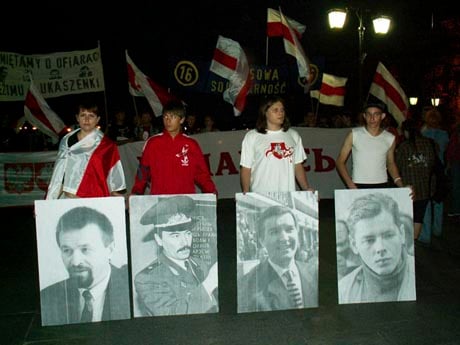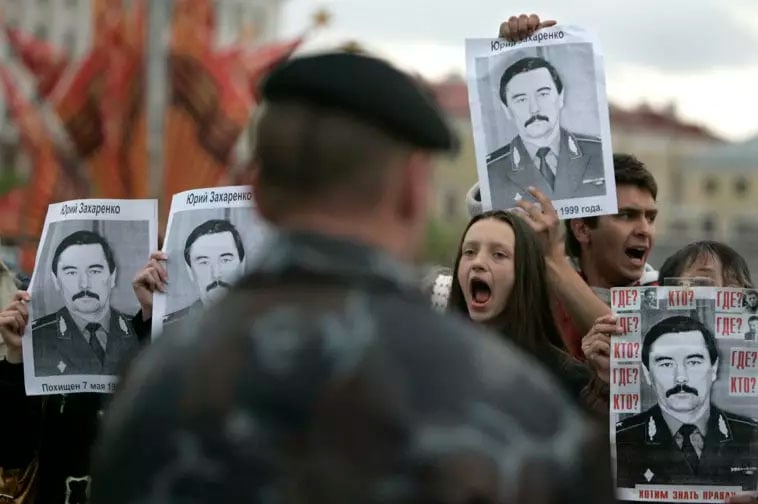Today Is Day Of Belarusian Solidarity
10- 16.09.2024, 23:20
- 13,020

Twenty-five years ago, Hanchar and Krasouski were abducted in Minsk.
Twenty-five years ago, one of the opposition leaders Viktar Hanchar and businessman Anatol Krasouski were abducted in Minsk.
In the evening of September 16, 1999, they came to the bathhouse, located in Minsk, 20 Fabrychnaya Street. They were last seen at about 22.35, when they both left the building and got into the Jeep-Cherokee belonging to Krasouski.
The criminal case on the disappearance of Hanchar and Krasouski was initiated by Minsk prosecutor's office. According to the investigation, the examination of the surrounding area revealed shards of plastic diffusers of car lights, traces of the car braking and hitting a tree, as well as traces of blood. The analysis of the evidence collected in the case, including the testimonies of witnesses, gives grounds to believe that Hanchar and Krasouski were forcibly abducted.
Opposition leaders Yury Zakharanka and Viktar Hanchar, businessman Anatol Krasouski and journalist Dzmitry Zavadski disappeared without a trace in 1999-2000. Late in the evening of May 7, 1999, Yury Zakharanka was abducted near Zhukouski Avenue in Minsk and taken away in a car to an unknown direction. On the night of September 17, 1999, politician Viktar Hanchar and businessman Anatol Krasouski were abducted near 20a Fabrychnaya Street. In the afternoon of July 7, 2000, journalist Dzmitry Zavadski was captured on his way from his home in Minsk to the airport by a group of armed men of 5-6 persons, including Maksim Malik, an active fighter of the ‘Almaz’ special anti-terrorist unit of the Ministry of Internal Affairs of the Republic of Belarus, and Valery Ihnatovich, a former officer of the same unit. The corpses of Zakharanka, Hanchar, Krasouski and Zavadski have not been found yet.

Politicians, journalists and human rights activists believe that Zakharanka, Hanchar, Krasouski and Zavadski were abducted by the so-called ‘death squads,’ which used to eliminate representatives of the criminal world of Belarus in the 90s. According to the preliminary conclusion of human rights activists, the main suspects in the case of abducting and murdering Zakharanka, Hanchar, Krasouski and Zavadski are Aliaksandr Lukashenka, Viktar Sheiman (then head of the Security Council), Yury Sivakou and Uladzimir Naumau (at different times - interior ministers), Dzmitry Paulichenka (then commander of the m/u 3214) and Mikalai Vasilchanka (then - head of the Presidential Security Service). The conclusions of the Belarusian human rights activists were confirmed in 2004 in a special report of Christos Pourgourides, a member of the Parliamentary Assembly of the Council of Europe, who conducted his own investigation.

Aliaksandr Lukashenka has repeatedly publicly admitted that extrajudicial killings of criminal authorities took place in Belarus on his orders. The last time he spoke about it was on April 24, 2018 during his address to the Belarusian people and the National Assembly. ‘Are you out of your minds? Or should I take tough measures, as in the first years of my presidential life, when people were killed on the Moscow-Berlin highway: when I sent a handful of reliable people with automatic rifles, who shot half of them there and brought order within a month,’ said the ruler of Belarus. However, Aliaksandr Lukashenka always denies his involvement in abducting Zakharanka, Hanchar, Krasouski and Zavadski. He emphasised that they were not his opponents, and in general, a lot of people disappear in Belarus every year, so one shouldn't pay so much attention to these cases.

The real investigation of these high-profile disappearances can be resumed only in case of changing the current regime. Representatives of the opposition, relatives of the disappeared and the international community believe that Hanchar and Krasouski were abducted for political reasons and suspect the involvement of the highest officials of the country in this crime.
For 25 years, despite the repression by the regime, Belarusians have come out to numerous rallies of commemoration, not letting the regime's crimes be forgotten. Since then the date of September 16 has become the Day of Belarusian Solidarity.











